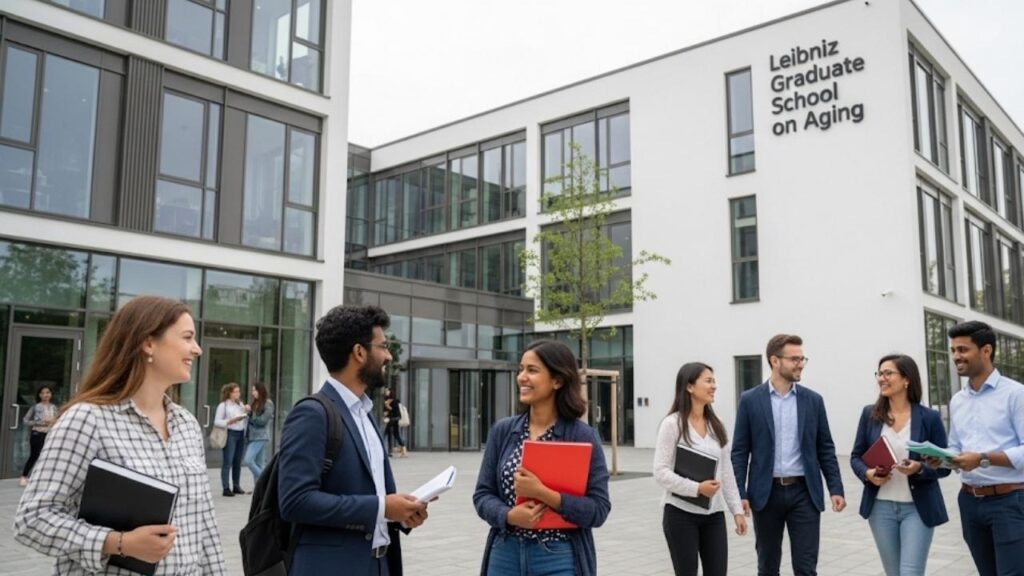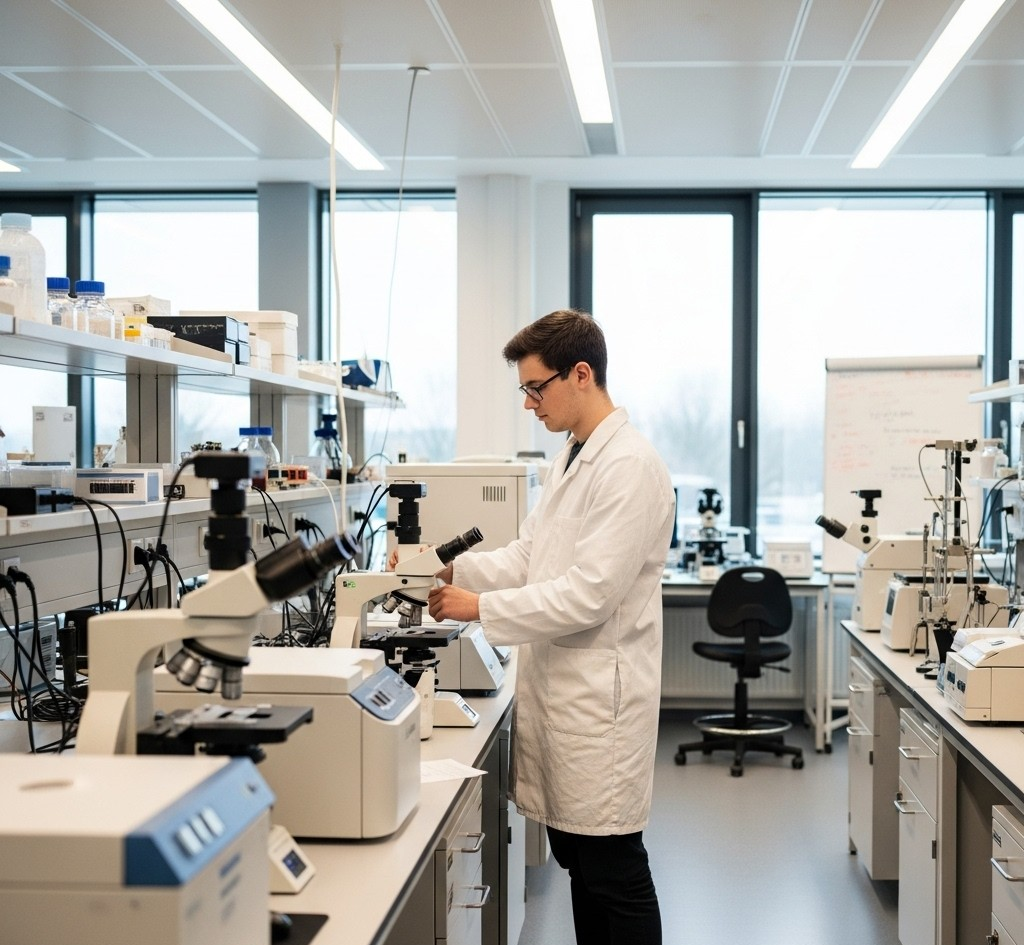Embarking on a PhD is a transformative journey, a deep dive into the unknown with the potential to uncover groundbreaking insights. For aspiring researchers passionate about the intricate mechanisms of aging and age-related diseases, the Fully Funded PhD Scholarship 2025 at Leibniz Graduate School on Aging (LGSA) offers an unparalleled opportunity. This prestigious program in Jena, Germany, provides not just financial support but a vibrant, interdisciplinary environment where innovation thrives, allowing you to focus wholeheartedly on your research.

Why Choose a Fully Funded PhD at LGSA?
Securing a fully funded PhD is often the golden ticket for aspiring academics, and for good reason. It alleviates the significant financial burden of tuition fees and living expenses, allowing you to immerse yourself fully in your studies and research without the constant worry of managing costs. In my experience advising students, one common hurdle is the financial strain associated with advanced degrees. That’s why scholarships like the one at LGSA are so incredibly valuable – they empower you to truly thrive.
The Leibniz Graduate School on Aging (LGSA) is part of the renowned Leibniz Institute on Aging – Fritz Lipmann Institute (FLI), a leading institution in aging research. This means you’ll be joining a community at the forefront of scientific discovery, working alongside world-class experts in a state-of-the-art facility. The research focus here is unique, encompassing stem cell aging, regeneration, molecular damages, and epigenetics of aging, providing a rich tapestry of research avenues to explore.
Fully Funded PhD Scholarship 2025 at Leibniz Graduate School on Aging (LGSA)
| Key Fact | Detail/Statistic |
| Funding Structure | Full working contract with salary (TV-L E 13, typically 65% working time) |
| Benefits Included | Health insurance and social insurance |
| Contract Duration | Initially one year, extendable up to three years, with a possibility for an additional one-year extension |
| Research Environment | Excellent, collaborative, cross-disciplinary research environment. PhDs at Leibniz |
The Fully Funded PhD Scholarship 2025 at Leibniz Graduate School on Aging (LGSA) presents an incredible opportunity for ambitious and talented individuals to contribute to vital research in the field of aging. With comprehensive financial support, a world-class research environment, and a structured program designed for success, LGSA empowers its PhD candidates to make significant scientific contributions. Don’t let this chance pass you by; start preparing your application now and take the first step towards a rewarding research career in Germany!. LGSA Procedures.
Eligibility: Are You the Right Fit?
To be considered for the Fully Funded PhD Scholarship 2025 at Leibniz Graduate School on Aging (LGSA), you need to meet specific academic requirements. Generally, eligible candidates are those who have obtained, or will obtain within the next six months, an academic degree comparable to a Master’s degree or diploma in life sciences, biology, biomedicine, chemistry, physics, or other related fields. Excellent written and spoken English skills are also a must. The LGSA emphasizes integrating all PhD students into their graduate school, so adhering to their specific guidelines is crucial for your application to be considered.
Academic Requirements
- Master’s Degree: A completed Master’s degree (or equivalent) in a relevant field such as biology, life sciences, biomedicine, chemistry, or physics.
- Academic Excellence: While specific GPA requirements aren’t always explicitly stated, a strong academic record demonstrates your potential for rigorous research.
- English Proficiency: High proficiency in English is essential for success in this international research environment.

Navigating the Application Process for a Fully Funded PhD
The application process for the LGSA PhD scholarship is thorough and designed to identify candidates with genuine potential and a strong commitment to aging research. It’s a three-step journey, and preparing meticulously for each stage can significantly boost your chances of success. I’ve seen many successful applicants focus on showcasing their passion and previous research experience in a compelling manner.
Step-by-Step Application Guide
- Submission and Evaluation of Documents: This initial phase requires you to submit a comprehensive application package. This includes:
- Application Form: Complete the online application form accurately and thoroughly.
- Curriculum Vitae (CV): Detail your academic background, research experience, publications (if any), and any relevant skills.
- Motivation Letter (Cover Letter): This is your chance to shine! Articulate your research interests, why you are passionate about aging research, why you want to join LGSA, and how your skills align with their research areas. Be specific and compelling.
- Reference Letters: You’ll need to provide the contact information for two referees who can speak to your academic abilities and research potential. Ensure they agree to provide letters within two weeks of your application submission. It’s a good idea to inform them well in advance.
- Degree Certificates and Transcripts: Provide certified copies of your Master’s and Bachelor’s degree certificates and transcripts.
- Recruitment Session and Interview: Selected candidates will be invited for a recruitment session, typically held in Jena, Germany (though exceptions for remote interviews may be made). This stage involves:
- Entrance Interview: A 30-minute interview with a selection committee, where you’ll briefly present your previous research and discuss a scientific publication provided by the committee. This assesses your critical thinking and scientific communication skills.
- Research Presentation: Be prepared to succinctly and clearly explain your previous research projects, highlighting your contributions and the scientific impact.
- Project Matching and Final Decision: If you pass the interview, you’ll be invited for a further assessment. This is where you get to meet Principal Investigators (PIs) who are offering PhD projects. You’ll also submit a preference list of research groups you’d like to join. The final decision rests with the PIs after the recruitment session, and you’ll be notified of the outcome.
Life as a PhD Student at LGSA
Life as a PhD student at LGSA is a dynamic experience, balancing independent research with structured training and collaborative opportunities. You’ll be working on your own research project, contributing to the broader scientific understanding of aging. The LGSA is committed to supporting its PhD candidates throughout their journey.
PhD students at LGSA receive a working contract, providing a stable income with social security and health insurance. This means you can focus on your research without significant financial concerns. The typical contract starts for one year and can be extended based on satisfactory progress, monitored by a Thesis Advisory Committee (TAC). This committee, comprising your supervisor and two external group leaders or senior postdocs, provides guidance and support, ensuring the quality and progress of your project.
Research Areas at LGSA
The LGSA and the FLI are known for their cutting-edge research. Their main research areas include:
- Stem Cell Aging and Regeneration: Exploring how stem cell function changes with age and its impact on tissue regeneration.
- Molecular Damages in Aging: Investigating the molecular mechanisms of damage accumulation during aging and their role in age-related diseases.
- Epigenetics of Aging: Understanding how epigenetic modifications contribute to the aging process and disease susceptibility.

Beyond the Lab: Community and Support
The LGSA fosters a supportive and international community. You’ll have opportunities to network with fellow PhD students, postdocs, and senior researchers. The school also offers various courses, seminars, and lectures, contributing to your professional development. PhD representatives are elected by the students themselves, providing a voice and contact point for organizational or personal matters. The ultimate goal is to publish at least one first-author paper in an international peer-reviewed journal and successfully defend your thesis, leading to a Ph.D. or Dr. rer. nat. degree from Friedrich Schiller University in Jena.
Tips for a Successful Application
Applying for a fully funded PhD scholarship can feel daunting, but with the right approach, you can significantly enhance your chances.
- Tailor Your Application: Don’t just send a generic application. Research the LGSA’s specific research groups and projects, and tailor your motivation letter to highlight how your background and interests align with their work.
- Strong Research Proposal (Implicit): While you might not submit a full proposal initially, your motivation letter and interview discussion should clearly demonstrate your ability to conceptualize and discuss research ideas.
- Polish Your English Skills: As stated in the eligibility, excellent English is crucial. If necessary, invest time in improving your written and spoken English.
- Seek Strong Reference Letters: Choose referees who know your academic and research capabilities well and can write compelling letters of recommendation.
- Prepare for the Interview: Practice discussing your previous research clearly and concisely. Be ready to critically analyze scientific papers and engage in scientific discussion.
Mastering the Application Documents for China Scholarships 2026: Ace Your China Scholarship 2026
Ulster University Postgraduate Certificate 2026 in Higher Education Practice
FAQ
Q1: What is the typical duration of a PhD program at LGSA?
A1: PhD programs at LGSA typically last for three years, with a possibility of extending for an additional year, provided positive feedback from your Thesis Advisory Committee.
Q2: Is there a tuition fee for the LGSA PhD program?
A2: No, the LGSA PhD scholarship is fully funded, meaning accepted candidates receive a working contract with a salary, including health and social insurance, covering their living expenses and eliminating the need for tuition fees.
Q3: What kind of support does LGSA offer to its PhD students?
A3: LGSA offers extensive support, including a structured PhD program, guidance from a Thesis Advisory Committee, access to state-of-the-art research facilities, professional development courses, and a vibrant international community.
Q4: Can international students apply for the LGSA PhD scholarship?
A4: Yes, the LGSA welcomes applications from qualified students of all nationalities who meet the academic and English language proficiency requirements.










